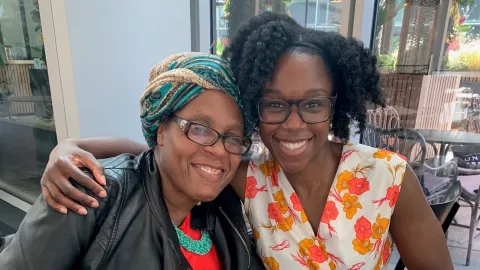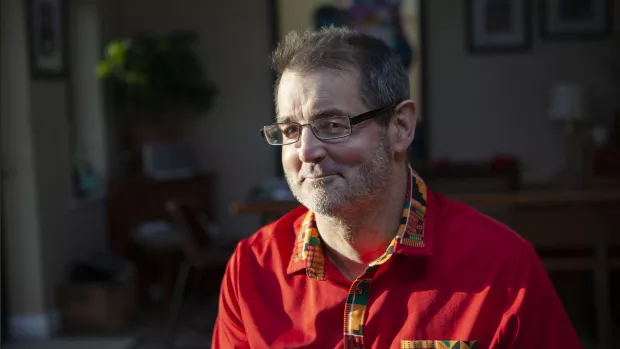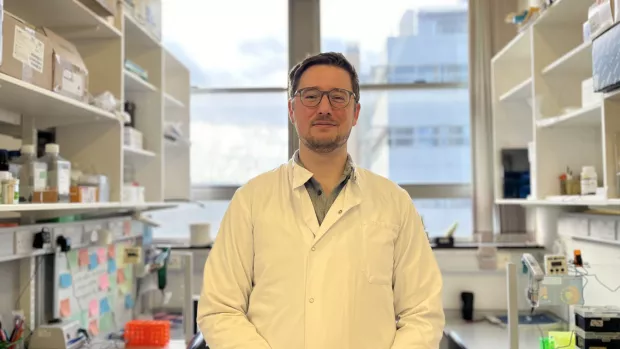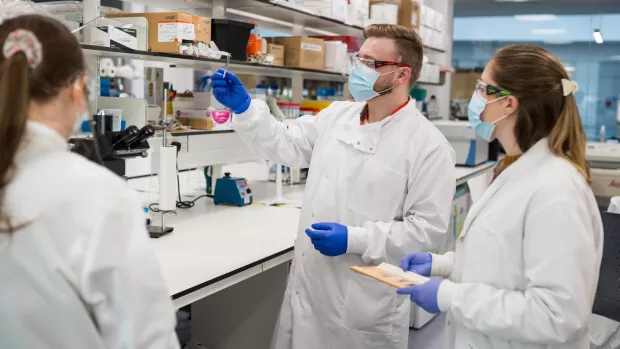
I want them to identify and understand MS in young people
Anne has lived with MS for just over 45 years. She talks here with her daughter Nicolla, who helps care for her, about their hopes for future research.
Anne: It took me losing my eyesight for them to pay attention and to give my illness a name. I had small children and no eyesight for six weeks. It did come back through – hooray! I just wear glasses now.
The other symptoms came on gradually, and now it’s secondary progressive. They didn’t diagnose it when it was relapsing remitting. They didn’t associate my symptoms with MS.
It’s a sneaky thing. I’d like more research into how you get it and the early symptoms.Anne
Nicolla: An 18-year-old saying they were feeling like that wasn’t really taken seriously at that time. People present differently too, and they don’t always listen closely enough, I think especially if you are of a different ethnicity. They kept saying to mum, ‘no this isn’t right, no its just tiredness’.
Anne: I was diagnosed when I was 21, but I’d had it for a few years before that. They just didn’t know what it was, or they thought I was too young to have MS. It was still quite new at that point in the 80s, people didn’t know what it was. We weren’t seen as a priority.
Nicolla: It would be good to see research that helps identify when someone has MS early, and then get treatment early. When mum got her diagnosis they essentially said there’s not much we can do.
Anne: I had my partner, their father, the family, but no additional support. It wasn't recognised properly, there was no focus on it. They said, this is what to expect and then that was it.
I never know how I am going to be in the morning, but I’m more supported now. I have a telephone number (for services), I have people around me. They can give me information that I don’t have myself. People take me out, and there is more understanding.
I’d like to see them catch it earlier, and to prepare young people for what might happen and what won’t happen. And to help them find ways to deal with it, the mental support.Anne
I feel like when I got MS, I died, but then I came back as a disabled person.
Nicolla: It’s a big transition to go from able bodied to disabled, both mentally and physically.
Anne: It can be hard to accept that you won’t get better. I went through all that. I thought I was going to die and not get better. I thought people would leave, but that’s not true. People who love you will be there for you no matter what. And you learn that you can live with it.
Sometimes people can’t accept the diagnosis. Some people fight against their need for a wheelchair, too. But for me, I got the wheelchair and I got another chance. I thought ‘I can make my life better’. So I say, take it and use it.
I feel like my children did this. They need me and they give me a reason to go on. They saved me.
Nicolla: Now that they are doing more research into progressive MS, I think that’s really important.
I’d love there to be hope a beacon for people that says they will not just decline, that even if they get progressive MS, something can be done.Nicolla
With my Mt Kilimanjaro fundraising climb, I was inspired to dig deeper to help fund potential cure or effective treatments for everyone. Research costs a lot and it’s so hard to go through all steps. People don’t realise how many years it can take come up with an idea or theory and run it through.
I found it really motivating to think that there’s so much to be discovered. I wanted to let the researchers know that they are not doing this alone. I don’t have the science head, but I’ve got the physical side of things and the determination to climb a mountain. We’re on the same team!
A small donation could have a massive impact on the project as a whole. It doesn’t need to be more than you can afford. It all makes a difference.
Anne: I’ve got this centre that I go to and I like to put the MS Society leaflet on the board to let people know. There must be a lot of people around that have MS and who don’t talk about it. There must be a lot of isolation.
Donate because you never know – it might be you, or your neighbour, or your family member that gets the diagnosis. Give them something to look forward to.
Our funding for researchers could lead to the next big breakthrough in understanding MS.
Give today and start something amazing.




